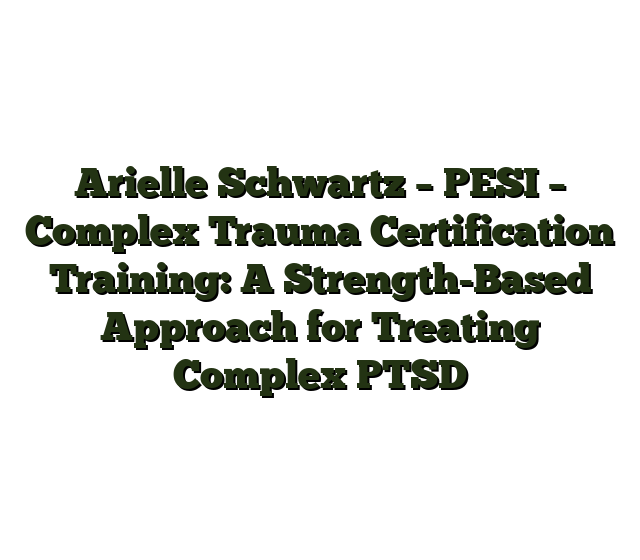Arielle Schwartz – PESI – Complex Trauma Certification Training: A Strength-Based Approach for Treating Complex PTSD
Arielle Schwartz – PESI – Complex Trauma Certification Training: A Strength-Based Approach for Treating Complex PTSD course is now available at an affordable price. You can check out directly using multiple payment gateway options. If you have any questions or need an alternative payment method, feel free to contact us.
Arielle Schwartz – PESI – Complex Trauma Certification Training: A Strength-Based Approach for Treating Complex PTSD
Many clinicians are trained in the treatment of single traumatic events, but are not fully equipment to treat Complex PTSD. The traditional approaches to the treatment of PTSD can fall short when working with clients with Complex PTSD. Watch this workshop to learn how you can adapt your therapeutic approach to help clients diagnosed with Complex PTSD achieve more successful outcomes.
The most common question asked when treating Complex PTSD is, “where do I start?”. In this training, you will develop confidence in your ability to successfully organize and prioritize your client’s treatment goals. You will learn how to compassionately and effectively work with clients who have experienced multiple traumatic events and prolonged trauma exposure.
Successful treatment requires a compassionate therapeutic relationship and effective, research-based interventions. After this training you will learn how to:
Help clients move out of crisis by building stabilizing resources
Prepare clients to work through traumatic memories without becoming overwhelmed
Develop an integrative trauma treatment plan that includes CBT, DBT, EMDR Therapy, Somatic Psychology, Parts Work Therapy, and Complementary and Alternative Medicine (CAM)
Watch Dr. Arielle Schwartz, trauma expert, trainer and author of The Complex PTSD Workbook, in this engaging and interactive seminar to learn valuable strategies that will allow you to successfully address the dysregulated affect and arousal states that accompany Complex PTSD. You will leave this seminar with practical tools that facilitate a strength-based approach to trauma recovery and increased resilience in clients.
Objectives
Distinguish key contributing factors to the development of Complex PTSD as it relates to client case conceptualization.
Analyze the impact of Complex PTSD on the cognitive, emotional, and physical health of the client.
Determine how to assess clients for Complex PTSD symptoms within other diagnoses, including personality disorders, mood disorders, anxiety disorders, and dissociative disorders.
Incorporate into clinical treatment practical mind-body therapy tools to help clients feel resourced and prepared for trauma processing.
Articulate the six stages of trauma responses within the neurobiology of Complex PTSD as it relates to clinical treatment.
Utilize assessment tools to properly assess for Complex PTSD to better inform treatment planning.
Analyze implicit memory foundations of preverbal and nonverbal memories.
Breakdown how mutual regulation within the therapeutic relationship teaches clients self-regulation strategies that help them develop new interpersonal strengths that help with the treatment process.
Analyze parts work from Structural Dissociation, Internal Family Systems, and Gestalt perspectives.
Evaluate the basic principles of a unified approach to somatic psychology.
Implement mindfulness-based techniques into trauma treatment.
Integrate interventions for the treatment of Complex PTSD drawn from CBT, DBT, EMDR Therapy, Parts Work Therapy, Somatic Psychology, and mind-body therapies.
Determine how the neuroscience of interpersonal neurobiology provides insight into the psychobiological changes possible within trauma treatment.
Analyze how working within the “Window of Tolerance” can help reduce the likelihood of re-traumatization.
Assess how “top-down” and “bottom-up” interventions can speed up or slow down the pacing of trauma treatment.
Differentiate past experience from present moment experience as it relates to the treatment of trauma.
Employ resilience as a strength-based approach that fosters growth and integration of a positive sense of self-identity in clients.
Evaluate the role of neuroplasticity in treating trauma.
Determine resilience and protective factors to aid against the development of PTSD.
Demonstrate effective strategies for working with clients’ preverbal memories.
Utilize relational interventions for shame.
Utilize EFT, Havening Technique, and other “neuromodulation” strategies for trauma recovery.
Apply techniques of focusing and resourcing to prepare clients for trauma reprocessing.
Analyze somatic cues to determine level of internal trauma processing.
Employ coregulation to reduce level of client distress.
Adapt standard trauma therapy to the increased demands of complex PTSD.
Outline
Post-Traumatic Stress Disorder vs. Complex PTSD: Understand the Difference
Acute traumatic stress, PTSD, Complex PTSD
Diagnostic clarification, differential diagnosis and co-morbidities
Key contributing factors of Complex PTSD
The common symptoms of Complex PTSD
The Neurobiology of PTSD: Beyond Fight and Flight
Polyvagal Theory
Stages of trauma response
Trauma specific psychopharmacology
Heart Rate Variability and the Social Nervous System
Interpersonal Neurobiology
Psychobiological regulation
Rupture and repair
Implications of childhood neglect or abuse
Neuroplasticity and Complex PTSD
Psychological and Physiological Repercussions of Complex PTSD: A Deeper Understanding for Accurate Assessment
Intrusive symptoms and anxiety
Emotional dysregulation: Outbursts of anger and debilitating shame
Avoidance symptoms and phobic reactions to traumatic material
Interpersonal problems and difficulty being close to others
Dissociation and dysregulation
Cognitive distortions and compromised meaning making
Physical health problems, ACE factors and painful somatization
Preverbal and nonverbal memories
Disturbing somatic sensations
Depressive symptoms
Learned helplessness and shame
Therapeutic Interventions for Complex PTSD: Summary of Effective Therapies
Psychodynamic and Relational Therapy
Psychobiological perspectives: Polyvagal Theory
Cognitive Behavioral Therapy (CBT)
Dialectical Behavioral Therapy (DBT)
EMDR Therapy
Somatic Psychology
Parts Work Therapy: Work with Ego States
Complementary and Alternative Medicine (CAM):
mindfulness, yoga, and integrative healthcare
Integrative Treatment for Complex PTSD: Putting it All Together for an Effective Treatment Plan
A Biopsychosocial Approach: Partner with clients to build a health care team
Goal of treatment: Memory retrieval vs. trauma recovery
History taking: Identify chronic, repeated, and/or developmental trauma events
Cultural factors and Complex PTSD
Recognize attachment injuries
Identify parts, ego states and defenses
Assess for dissociation (“fragmentation”)
Clinical Vignette #1
Mutual regulation and relational repair in therapy
Prepare for trauma processing: Develop resources and stability
Working with parts of self
Work through traumatic memories: EMDR and Somatic Psychology
Clinical Vignette #2
Grief work in Complex PTSD
Integrate and Instill positive change
Experiential Interventions: Mind-Body Practices for Clients with Complex PTSD
Conscious breathing for self-regulation
Grounding and sensory awareness
Containment: Reclaim choice and control
Build imaginal allies
Cultivate mindfulness, acceptance, and self-compassion
Somatic interventions: Titration, sequencing, and somatic re-patterning
Bilateral stimulation and dual attention in EMDR Therapy
Potential risks and limitations of mind-body therapies
Special Considerations in Complex Trauma Treatment
Working with Preverbal and Nonverbal Memories
Working with transgenerational trauma
Somatization, Chronic Pain and illness
Gate Control Theory
Mindfulness, Yoga, and Compassion Based Interventions
Clinical Vignette #3
Fostering Resilience: For Post-Traumatic Growth and Healing
Learn the 6 Pillars of Resilience
Trauma recovery and the bell curve
Resilience as a process and an outcome
Help clients move from learned helplessness to learned optimism
Post-Traumatic Growth: Help clients reach their potential
Vicarious Trauma: Improve Client Outcomes Through Effective Self-Care
Identify resources that improve your clinical skills
In-session self-care to improve focus on the client and therapeutic process
Burnout prevention techniques
Clinical Vignette – Wendy
56 year old woman with Hx of Bipolar Disorder, PTSD, DDNOS and Borderline traits
Trauma history of neglect, grandmother suicide, father inappropriate sexually
Addressing internalized negative aspects of parents
Goals of therapy
Integrative Approach to Trauma Reprocessing
Focusing and resourcing
Touchstone target
Negative and positive cognitions
Emotions and body sensations
Deepening the work
Parts work, pendulating between distress and resource, and somatic interventions
Top down and bottom up
Cognitive reappraisal, somatic interventions, and parts work
Somatic repatterning and reprocessing
Parts work, cognitive reappraisal
Integration: A path to self-regulation
Parts work, somatic integration, and cognitive reappraisal
Target Audience
Counselors
Social Workers
Psychologists
Physicians
Case Managers
Psychotherapists
Addiction Counselors
Marriage and Family Therapists
Nurses
Other Mental Health Professionals
Delivery Policy
When will I receive my course?
You will receive a link to download/view your course immediately or within 1 to 24 hrs. It may takes few minutes, also few hours but never more than 24 hrs. Due to different time zone reasons.
How is my course delivered?
We deliver courses through Google Drive or Telegram. Once your order is complete, you?ll receive an email with a Google Drive or Telegram channel access link to view/download the course.
In case you submit a wrong email address, please contact us to resend the course to the correct email.
Where can I find my course?
Upon completing your order, a link to download or access the course will be sent to your email. Alternatively, you can find it in the ‘My Account’ download section.
If you do not see it there, please share a screenshot of your order and payment with me on Telegram at @ bossallcourses_bot to ensure prompt assistance. I am highly responsive on Telegram.








Reviews
There are no reviews yet.